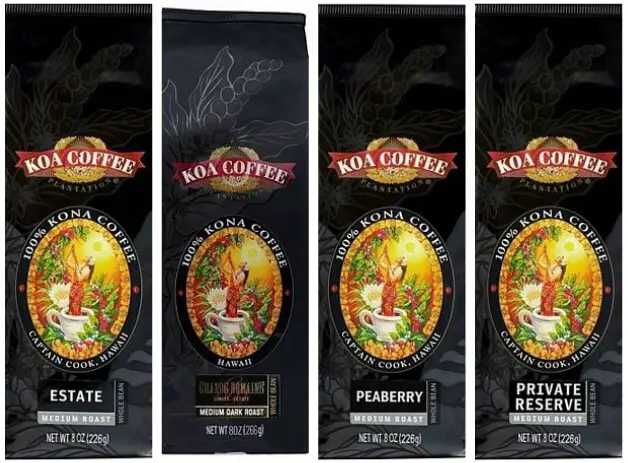When it comes to exquisite and highly sought-after coffee, Kona and Blue Mountain are two names that often stand out. Kona coffee hails from the slopes of Hawaii’s Mauna Loa volcano, while Blue Mountain coffee is grown in the misty peaks of Jamaica’s Blue Mountains.
In this blog post, we will delve into the characteristics, flavor profiles, and cultural significance of these two renowned coffee varieties to help you understand the differences and make an informed choice.

Table of Contents
Origin and Growing Conditions
Kona coffee is cultivated in the fertile volcanic soil on the western slopes of Hawaii’s Big Island. The combination of rich soil, consistent rainfall, and ample sunlight creates an ideal environment for coffee cultivation. On the other hand, Blue Mountain coffee is grown in the lush and misty Blue Mountains of Jamaica, where the high altitude, cool climate, and fertile soil contribute to the unique flavor of the beans.
Flavor Profiles
Kona coffee is renowned for its smooth, well-balanced flavor. It is often described as having a mild acidity with subtle hints of sweetness, chocolate, and nutty undertones. The flavor profile of Kona coffee can vary depending on factors such as the specific region, elevation, and processing methods employed by the farmers.
Blue Mountain coffee, on the other hand, is characterized by its mild and delicate flavor. It is known for its bright acidity, medium body, and vibrant citrusy notes. Blue Mountain coffee is often described as having a well-rounded flavor with hints of floral and nutty undertones.
Cultivation and Harvesting Practices
Kona coffee is typically grown on small family-owned farms in Hawaii. The cultivation process involves careful attention to detail, handpicking the ripe cherries, and meticulous processing to ensure the highest quality beans. The labor-intensive nature of Kona coffee production contributes to its premium status and limited availability.
Blue Mountain coffee is also grown on small farms in Jamaica, where farmers adhere to strict regulations and quality control measures. The beans are handpicked when fully ripe, and great care is taken during processing to preserve the coffee’s unique characteristics. The limited production capacity of Blue Mountain coffee adds to its exclusivity and higher price point.

You can buy pure, organic Kona Coffee here.
Rarity and Price
Both Kona and Blue Mountain coffees are considered specialty coffees and are known for their premium quality. Due to their limited production and high demand, they tend to be more expensive compared to other coffee varieties. The price of Kona and Blue Mountain coffees can vary depending on factors such as the estate or farm, the grade of the beans, and the overall market conditions.
Cultural Significance
Kona coffee holds significant cultural importance in Hawaii, and it is often referred to as the “coffee belt” of the state. The coffee industry in Kona has deep roots, and the local farmers take immense pride in producing top-quality beans that represent the region’s heritage and tradition.
Similarly, Blue Mountain coffee holds a special place in Jamaican culture. It has gained a reputation as one of the world’s finest coffees and is celebrated as a symbol of national pride. Jamaican Blue Mountain coffee has even been granted protected status to ensure its authenticity and preserve its unique reputation.
Kona vs. Blue Mountain Coffee
| Characteristic | Kona Coffee | Blue Mountain Coffee |
|---|---|---|
| Origin | Grown in the fertile volcanic soil of Hawaii’s Big Island | Cultivated in the misty peaks of Jamaica’s Blue Mountains |
| Flavor Profile | Mild acidity with hints of sweetness, chocolate, and nutty undertones | Bright acidity with citrusy notes and a well-rounded flavor |
| Cultivation and Harvesting | Small family-owned farms, handpicked and meticulously processed | Small farms adhering to strict regulations, handpicked and carefully processed |
| Rarity and Price | Limited production, higher price compared to other coffees | Limited availability, higher price due to exclusivity |
| Cultural Significance | Represents the heritage and tradition of Hawaii | A symbol of national pride for Jamaica |
Conclusion
Kona and Blue Mountain coffees are revered for their exceptional quality, distinct flavors, and cultural significance. While Kona coffee offers a well-balanced and nuanced taste, Blue Mountain coffee impresses with its delicate flavors and bright acidity. Both varieties have their devoted fan base and are sought after by coffee connoisseurs around the world.
When choosing between Kona and Blue Mountain coffee, consider your personal taste preferences, budget, and the experience you seek from your cup of joe. Whether you are drawn to the smooth and balanced flavor of Kona coffee or the delicate and vibrant notes of Blue Mountain coffee, both options promise a remarkable coffee experience.
It’s worth noting that due to their premium status, Kona and Blue Mountain coffees are often sold in specialty coffee shops or through reputable online retailers. When purchasing these coffees, look for trusted sources that can provide information about the origin, quality, and processing methods of the beans.
Finally, remember that coffee preference is subjective, and what appeals to one person may not be the same for another. Exploring different coffee varieties, including Kona and Blue Mountain, allows you to expand your palate and discover the flavors that resonate with you the most.
In conclusion, both Kona and Blue Mountain coffees represent excellence in the world of specialty coffee. With their unique flavor profiles, cultural significance, and limited availability, they offer a glimpse into the craftsmanship and dedication of coffee growers in Hawaii and Jamaica. Whether you choose Kona or Blue Mountain, savor the experience and appreciate the artistry that goes into each cup.
